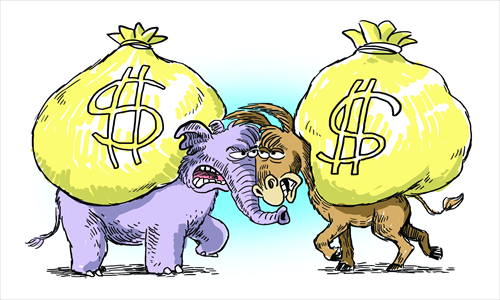Powerful interests work against expression of US democracy

The US government, and many US citizens and organizations, habitually give lessons in democracy to other nations. US President Barack Obama has been loudly denounced by his opponents for supposedly not believing in US "exceptionalism," our innate moral superiority. Let me examine our claims to democratic perfection in the light of the presidential election.
Democratic practice requires equality of access to voting rights for all adult citizens. But 2.5 percent of adults are permanently disenfranchised because of having been convicted of a felony in states where this disbars you from the voting rolls. Most are poor, and many African-American or Latino, traditional Democratic supporters, so the disenfranchisement disadvantages the Democratic Party.
Some Republican governments of the separate states, which set standards for eligibility to vote, are imposing onerous identification requirements on voters. These impede voting for the elderly, the poor, and ethnic minorities. The courts have generally upheld Democratic Party objections.
Other attempts at voter suppression are being made by vigilante groups, again Republican, seeking to intimidate voters at election sites. It is impossible to calculate exactly how many voters will be disenfranchised in November by official and unofficial means, but the figure could be as high as 5 percent, a critical margin in a system where elections are usually tight.
Another requirement of democracy would be equal access to information by all voters.
The US has a singular educational system, with the world's best universities and some of the worst schools in the developed world. Some forbid the teaching of evolution, and censor history texts to excise critical perspectives. Even in the universities many ambitious and talented scholars are apologists for the economic and social order.
Ordinary citizens have great difficulty in forming adequate notions of the world beyond our borders, or of the functioning of the economy. They are at the mercy of media dominated by uninformed and shallow reportage, owned by groups inhospitable, to criticism of the existing distribution of wealth or of the imperial ideas of the foreign policy elite.
Citizens are told that the greatest economic danger to the nation is not rising inequality, unemployment, insufficient investment in education and social and material infrastructure, but the federal budgetary deficit.
They are also told that "Islamist terror" justifies enormous military expenditure. A Cold War-like ideological factory produces any number of inflated or fabricated threats, including a modern revival of the menace of China.
There are counter-currents, dissident intellectuals, and independent groups, but it is difficult for them to join much less shape national debate.
The diminished trade union movement can no longer educate a majority of the working class it once organized. The anti-imperialist movement which stopped the Vietnam War is a memory of aging and saddened militants with no place to go. Whatever Obama's inclinations, he is the prisoner of an apparatus which has one priority: to prevent the emergence of alternatives.
Meanwhile, tidal waves, no Tsunamis, of money inundate the electoral process. Recent legislative and judicial actions have terminated all restrictions on political donations which can be made anonymously. Large capitalist interest groups and wealthy individuals are financing the candidates, with Republican candidate Mitt Romney and Obama already spending more than $1 billion each. Additional sums are going to the congressional, senatorial and state elections.
It is true that Obama and some Democrats are appealing to small donors for small sums, with a modicum of success. However, what we have of the public sphere is deformed by the capacity of some to spend money to influence candidates and office holders, to define issues in the media, to suppress opposition to their projects and perspectives. The efforts of churches, civic groups and unions to organize ordinary citizens are great, but the influence of the propertied is greater.
Finally, there is the electoral system itself. The president is not elected directly but by the electoral college, in which most states award all their votes to the candidate with the most votes.
Expected large majorities for Obama in California and New York, and for Romney in Georgia and Texas will give them the electoral votes of these states, but large numbers of votes will not be counted: Coming ahead by several hundred votes is as effective as winning by tens or hundreds of thousands.
If the results of one or several states are contested in the courts, the decision will fall to unelected judges and not to the citizens. If the electoral college results are tied, the president is elected by the house of representatives and the vice president by the senate, a procedure which would provoke frenzied bargaining and hidden agreements.
There is clearly much room for improvement in our system. Forty percent of our citizens, who habitually do not vote, seem to agree.
The author is an emeritus professor at the Georgetown University Law Center. opinion@globaltimes.com.cn